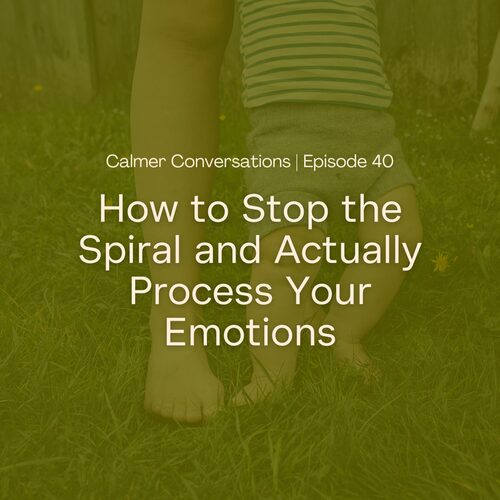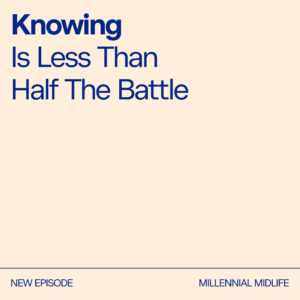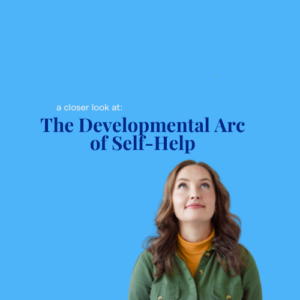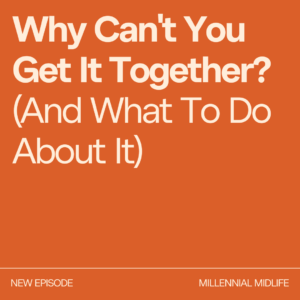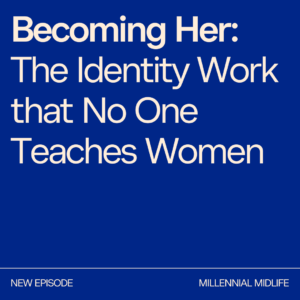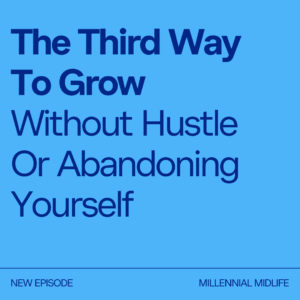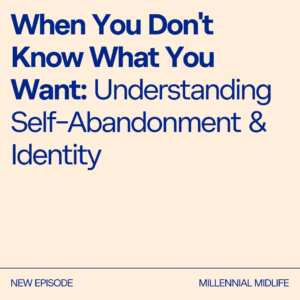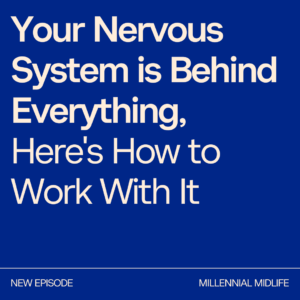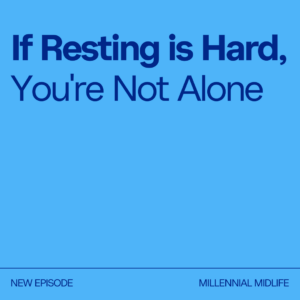Cecelia Baum Mandryk (00:01.112)
Hey, and welcome to Calmer Conversations. I’m Cecilia, your host today. I wanna talk about the difference between spiraling and processing emotions. The reason why I wanna talk about this is it’s something that comes up over and over again with my clients, whether they’re one-on-one or we’re in a group together or questions that I have when I offer workshops, sometimes messages that I get on social media. And it’s knowing the difference between spiraling
and processing emotions. so if you’re a human and you have emotions, this will probably be helpful for you. So even if you don’t feel like you spiral, you might want to stick around. All right, so first I want to kind of define spiraling for perhaps you, for everybody. So spiraling is when something happens, right And I’m gonna use an example from somebody in one of my groups because it came up recently. And I’ll try and use a couple different examples because they’ll relate to different people or you might understand them better. So if something happens, like you get feedback on a presentation that you’re gonna give at work, right? And this could be, just think of your own job, right? It doesn’t really matter what level it’s at. You get feedback and your boss, your manager is disappointed in it or has some concerns about it.
and you start to feel something in your body, right? And you might name it as fear, you might name it as shame, maybe you feel like a smallness or a closed off-ness in your throat or like a pit in your stomach, whatever it is for you, that starts to happen. And you might even start to think of a situation for yourself. Spiraling is when your brain, instead of being with that fear that is happening in that moment, starts to list and go through everything else that’s happening in your life.
starts to maybe remember other times where people have been disappointed in you, starts to remember all the other big things that are going on in your life that might go wrong that you don’t perhaps feel like you have a handle on in this moment. It kind of moves you from the present moment into everything else that you’re kind of familiar with, right? We all have at various points in our life, the tape probably sounds different, but we have a tape that runs through our head.
Cecelia Baum Mandryk (02:11.694)
of like, well then this is gonna happen and then this is already going on and I don’t know how I’m gonna handle this and this is already a problem. So that’s one example of spiraling. I’m gonna give you one more from another client. So this person has had a surgery recently and they’ve been healing and they’re kind of in this place of, they can’t do a lot, right? And like a lot of us, and I’ll raise my hand here, at least previous versions of me, our worth is tied to what we do.
We feel like we’re valuable because of what we can contribute or how we’re helping other people or how we’re showing up in our life. So this person wakes up and they realize they kind of think about what they’re gonna do today or not do today. And instead of staying in that moment with that specific emotion, the brain starts to go off onto all the other things that are happening and how they’re not doing this right and they don’t.
they’re not capable in this area and this is falling apart and by the way, also socialize inappropriately or not right. And their brain just starts to layer it all on. But really what it’s doing in that moment, when you start to spiral, so think for yourself if you wanna play along with this and get something out of this episode, I want you to think of an emotion that’s perhaps challenging for you to feel. It could be fear, shame, disappointment.
embarrassment, could even be something like joy, but really, most of us have something that’s challenging, right? And usually it’s not too different from other people, although it’s fine if you have one that’s more unique. But pause and think the last time this thing came up, this emotion.
And what generally happens when we have an emotion that is hard for us to process, our brain goes off into some other area to protect us. And this is because your brain really prefers known discomfort over unknown discomfort. You’ve been through known discomfort. Known discomfort hasn’t killed you. It’s not great. It’s not perhaps your preferred way of being, but for your primitive brain or for the brain that’s helping to keep you alive in the moment,
Cecelia Baum Mandryk (04:21.29)
It knows this, right? It knows the tape version of what you worry about. It knows that that’s not gonna necessarily hurt you. That part of your brain doesn’t like the new thing, the in the moment thing, because it is new, it is unknown, and so according to that part of your brain is more dangerous. Right, and I use the word dangerous intentionally.
because your brain thinks that it is a threat, a physical threat to your life and well-being. Perhaps that means that you won’t be accepted by your tribe around you and then you’ll be kicked out and then you’ll die, right? And that sounds dramatic. I know it sounds dramatic, but that’s kind of what’s happening in your brain, right? Your brain goes to that level. You might be somebody who spirals a lot. Most of us spiral to some extent. You might also do other things. So in this moment, you might consider that emotion the last time that it came up and you might say, well, I actually went to
For instance, I started eating or I went over to social media. I tried to kind of buffer from it or avoid it in some way. Those are really important for you to know because essentially here what we’re trying to do is we’re trying to study our brain. We’re trying to bring awareness to our own psychology and our own pattern so that we can shift and change them if they’re not serving us. And most people would say that spending an hour or a day or a week
or a month or a year or a decade spiraling about something. And some of us can do that, right? We can spend years of our life in these kind of emotional spirals or essentially ways for our brain to avoid what’s happening in the moment because it feels dangerous and unavailable for us to work through. So if you’re not a spiraler, but you do something else, you might even.
you can kind of use this there too, but just know that that’s how your brain is trying to avoid this, right? The spiraling is just another way to avoid the current emotion. And spiraling about something is not processing emotion. It’s actually avoiding the current emotion, as I just said, and it’s keeping you in the space where many of us think that we’re feeling the emotion, because maybe we’re getting more angry or we’re getting more disappointed or we’re feeling more shame, but we’re feeling them about other things.
Cecelia Baum Mandryk (06:34.412)
And we’re not moving through the emotion. We’re kind of like rolling around in it, right? We’re like, we’re, had just had an image probably from one of the kids books I’ve read recently of like a pig kind of like rolling around in the mud, right? We’re in it, but we’re not actually processing it. And because we’re not allowing our body and our brain to process it, we’re not actually, we’re not actually feeling the feeling. We are recycling.
and reiterating the thoughts contributing to the feeling, but you are not feeling the feeling. And that’s such an important distinction because so many of us mistake the feeling of anger as that regurgitation, as that rolling around, as that cycle in the washing machine where there it’s just like, I’m thinking of the top loading ones where you can see it just going back and forth, the agitation cycle. You’re just in that, you’re…
You are repeating the thoughts that are bringing up this emotion, but you are not feeling the feeling. And this in its own way is a resistance to feeling the emotion. It’s a pushing of the emotion away because the emotion feels scary and hard and uncomfortable and all these other things. And you might’ve picked up messaging from when you were younger that you couldn’t feel it and it’s dangerous for other people around you and you’re not acceptable and on and on and on, right? But processing it, because processing an emotion takes about
30 to 90 seconds if we allow it to happen in our brain and body. Processing the emotion means, if we think about that email from the boss about the presentation, right now I’m feeling fear. Fear feels like this in my body and describing it to yourself. This version of fear, right now it feels like a 7 out of 10.
And the story I’m telling myself right now in this moment around this particular fear is I’m not good enough.
Cecelia Baum Mandryk (08:33.878)
And right now, I forgive myself for believing and buying into that thought. I can allow the fear to be here. I can take some breaths with it. I can tap with it. I can use some other form of processing that I’ve learned. Can draw it out.
and I’m willing to let this fear go right now. I know that this is based on a false belief that I picked up somewhere along the line and I’m willing to let it go. And if you go this route instead of the spiraling route, what you’ll start to find is, and remember this is a muscle so you have to kind of exercise it and get used to using it. I’ve been working out recently and I have not been working out with weights for a very long time. I used to
lift weights a lot because I used to row. weightlifting was part of that. And I haven’t done it in a long time and they’re heavy and you feel sore and you feel like not incompetent, that’s the word that came into my head, but like incapable in some ways, right? Like, oh, I’m going to have to build this up. But the app that I’m using and the person’s voice, you know, she reminds us that like whatever feels hard today is the strength that you’ll have tomorrow.
And think this is also true for these things that we do with our brain and with our emotions. So this is a muscle that you’re trying to strengthen. And this muscle, what you’re trying to say to yourself is, okay, now I believe I can be with this emotion. I’m not gonna let my brain take a right turn into talking about all the other things that might bring up this emotion and stay in the intellectualization or the justification.
or the mind chatter around it. What I’m gonna do is I’m gonna try and drop into my body. I’m gonna try and love myself. I’m gonna try and forgive myself. I’m gonna try and describe the physical sensations of the emotion because the emotion is just a set of energetic physical sensations that are happening, right? I’m gonna be with them. I’m gonna see if I can understand the story and I’m gonna ask myself if I’m ready to let this go.
Cecelia Baum Mandryk (10:35.894)
if I’m willing to let it move on from me. And as soon as you’re willing to let it move on, and you don’t have to be, right? You can say, nope, I’m ready, I wanna stay here for a while, it will start to dissolve and move on. Your body knows how to do this, your nervous system knows how to do this, you just have to give it the chance. Many people think that if they start to feel an emotion, they will get consumed by it, they will become it. If they allow anger, they will become an angry person.
But I will say that it is resisting anger and that you become an angry person. When you resist anxiety, you become more anxious. When you start to tap into this allowing, suddenly everything that comes up, every emotion is more manageable, it’s more workable, and it moves through you in a much different way. And I’ll just give a quick personal example before I kind of end this today. When we were moving from Maine,
when we kind of had made the decision and we talked it through and it made sense to us what we were doing. There were still a lot of emotions around letting go of that place where one of my children was born, where I’d had a miscarriage and we buried the baby, where I spent so much time building my business and had these videos in my office and all these things that I loved. And I would get these waves of emotion. And because I practiced this a lot, I would recognize, I’m feeling grief right now, or I’m feeling loss right now, or I’m feeling
maybe even shame about like this is not working out for us, for me. And okay, what does this version feel like right now? And I’m gonna be here with it. And sometimes that meant crying and sometimes it meant laughing and sometimes it meant just noticing what’s happening. What is the current story around this that I can get in touch with? And am I ready to let this go? I ready to not be consumed by it, but to let it flow through me? And when that happens,
You have this entirely different experience of emotions and they become less scary and you learn that they’re not going to hurt you and you actually have the capacity to work with them and through them. Okay, I know we’ve talked about emotions a lot recently, but this is the work we do in the Life Lab. This is the work that we do every single week when we have the lessons and we have the group coaching and it is extremely powerful because someone gets to come back and say, you know, that thing we talked about processing.
Cecelia Baum Mandryk (12:53.324)
That’s okay, but I actually have trouble feeling anger and I have a lot of stories around it and we get to go back into it. So you get to work through it. So you become this kind of, you study your own life, you study your own brain, you get this feedback so that you recognize you’re never doing anything wrong. You’re never, there’s never anything wrong with you. There’s just like these points of clarification and tweaking and figuring out your rhythm and your process for working through it because what works for me doesn’t necessarily work for you or somebody else that’s in the group.
We just have to figure out which path is your path at this moment through it. I hope that this was helpful. If you’re a spiraler, I used to be a spiraler. You do not have to be a spiraler anymore. You can move into being a processor, but it takes recognizing that’s what you’re doing, admitting that you’re resisting and avoiding emotions and being willing to step into something different. All right, I will see you the next time I see you. I love you all so much. Bye.

